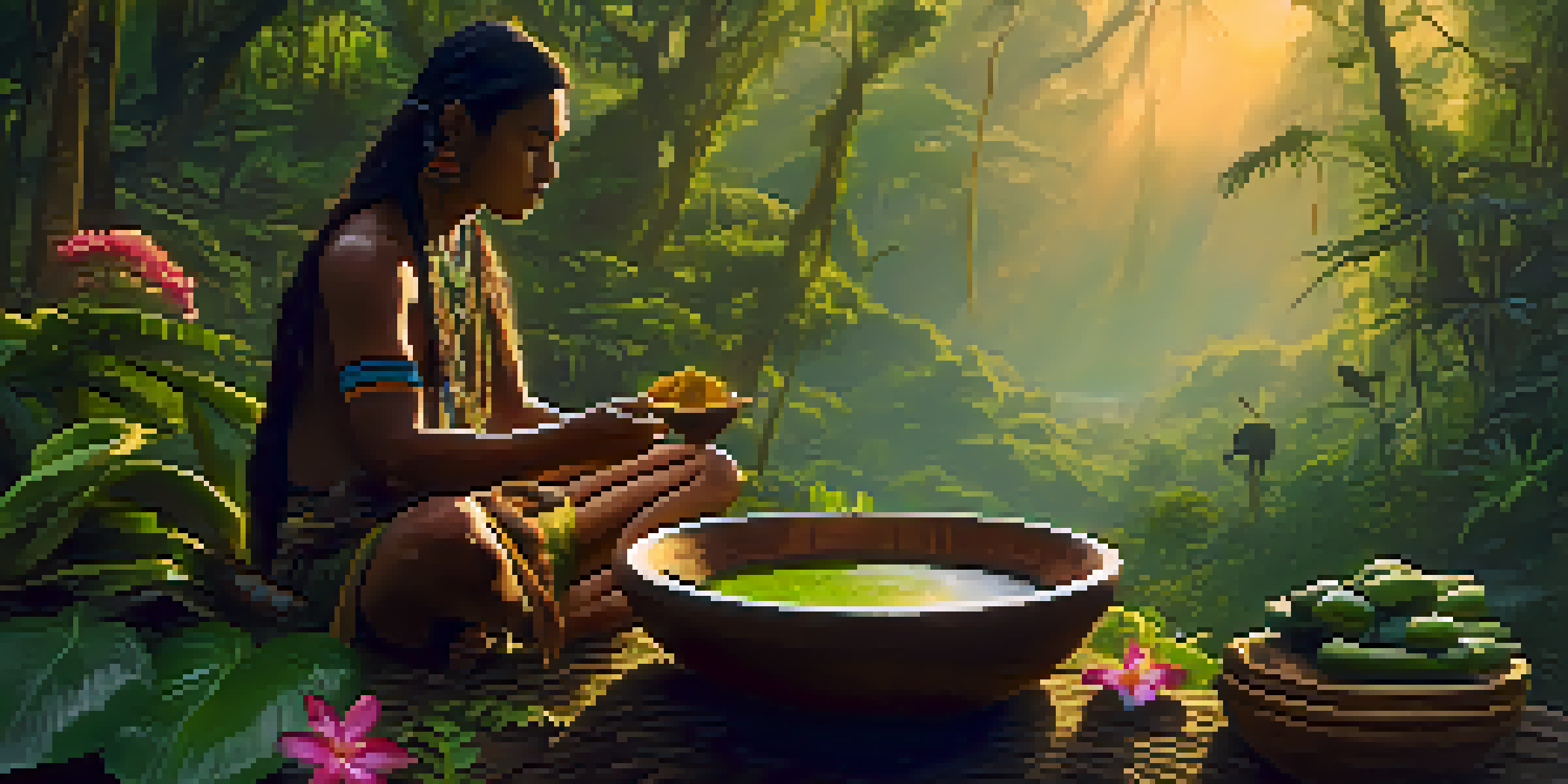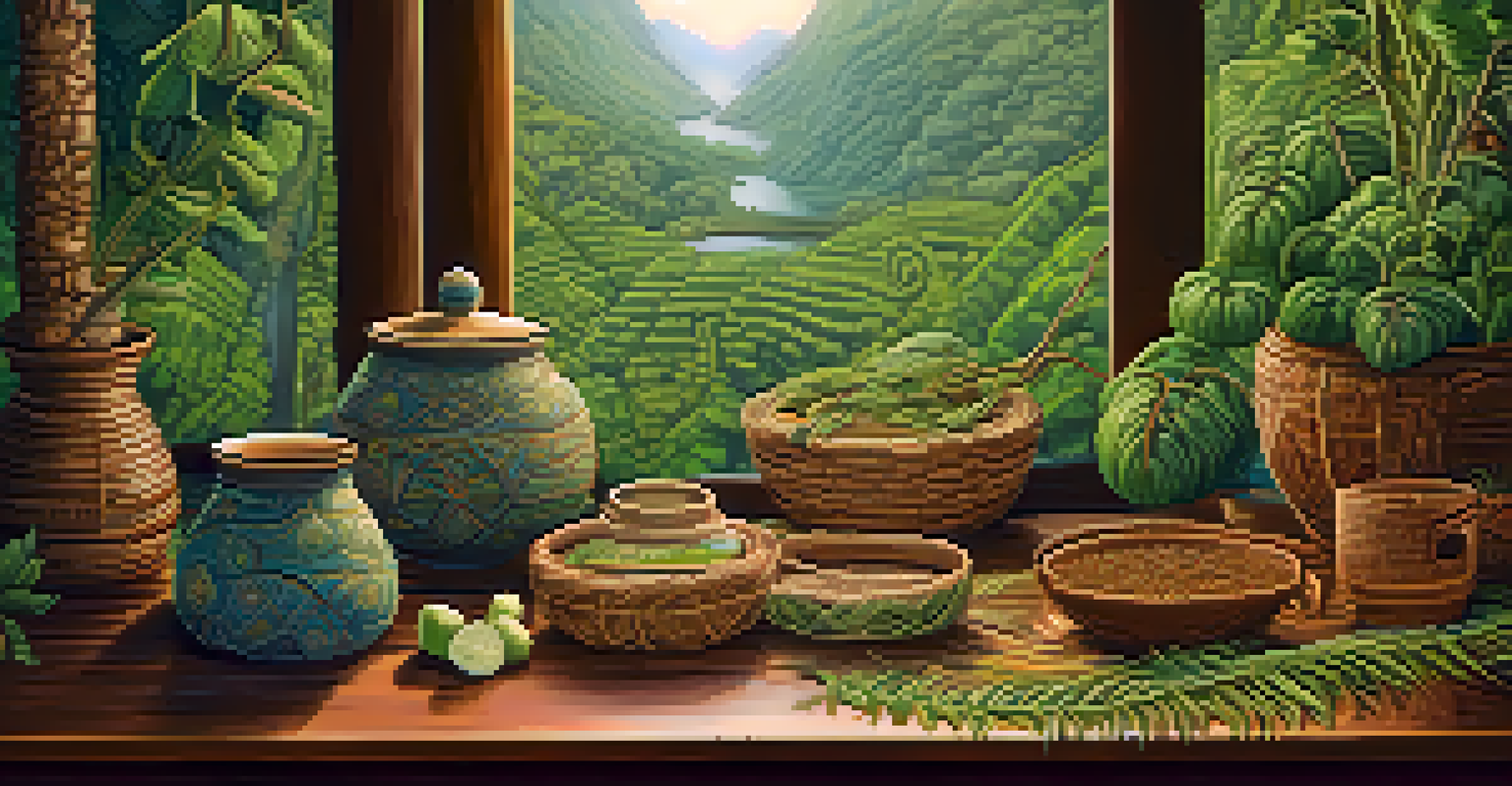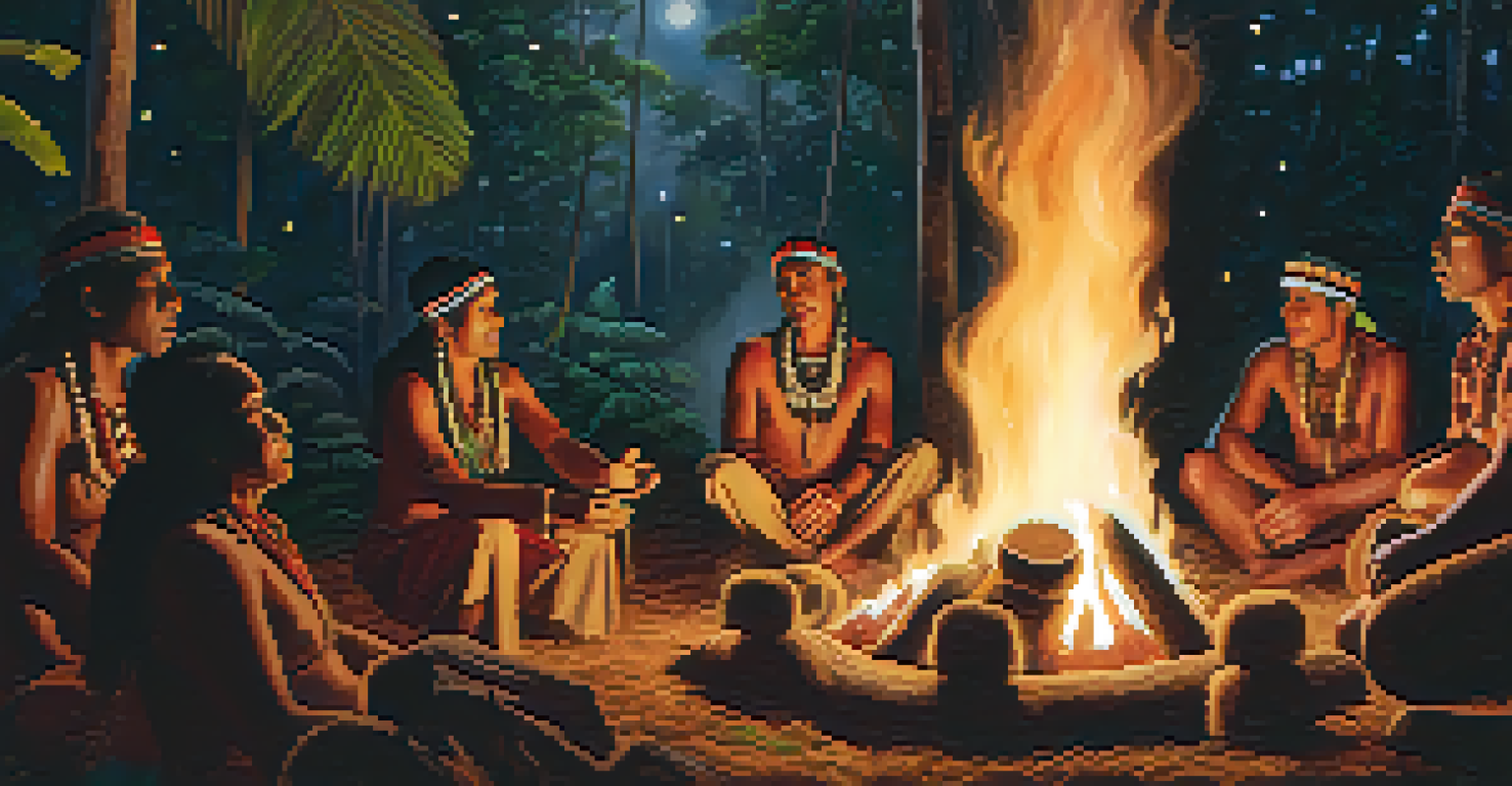The Preservation of Indigenous Ayahuasca Knowledge Globally

Understanding Ayahuasca and Its Cultural Significance
Ayahuasca is a sacred brew made from the Banisteriopsis caapi vine and other plants, traditionally used by Indigenous communities in the Amazon. It serves not just as a hallucinogen but as a spiritual tool, aiding in healing and connecting individuals to their cultural roots. For many tribes, the rituals surrounding Ayahuasca are integral to their identity and worldview, emphasizing the importance of nature and ancestral wisdom.
Indigenous wisdom is not a relic of the past; it is a living tradition that continues to inspire and guide us today.
The cultural significance of Ayahuasca goes beyond personal experiences; it embodies collective traditions passed down through generations. These rituals often involve songs, stories, and communal gatherings that strengthen social ties and preserve ancient knowledge. Such practices are vital for maintaining the cultural heritage of Indigenous communities, especially as globalization threatens to dilute their traditions.
As interest in Ayahuasca has grown worldwide, it has sparked discussions about cultural appropriation and the ethical implications of using Indigenous practices. As outsiders seek these experiences, it raises questions about respect, authenticity, and who truly owns this ancient knowledge. Understanding these dynamics is crucial for fostering genuine appreciation and responsible engagement with Indigenous cultures.
The Impact of Globalization on Indigenous Practices
Globalization has been a double-edged sword for Indigenous Ayahuasca traditions. On one hand, it has introduced these practices to a broader audience, allowing for a sharing of culture and knowledge. On the other hand, this exposure can lead to commercialization, where the sacredness of the rituals is overshadowed by profit motives, often at the expense of the communities that have preserved them for centuries.

With the rise of Ayahuasca tourism, many Indigenous leaders express concern over the authenticity of the experiences offered to outsiders. Some retreats may prioritize profit over cultural integrity, diluting the rituals and their meanings. This commercialization can undermine the spiritual and healing properties that Ayahuasca embodies, reducing it to just another 'experience' for tourists.
Cultural Significance of Ayahuasca
Ayahuasca is not just a hallucinogen; it serves as a spiritual tool integral to the identity and worldview of Indigenous communities.
Moreover, the commodification of Ayahuasca can lead to environmental degradation. Increased demand for the plants used in the brew can result in overharvesting, threatening their natural habitats. This situation highlights the need for sustainable practices and the importance of protecting both the environment and the cultural traditions intertwined with it.
Efforts to Protect Indigenous Knowledge and Practices
To combat the threats posed by globalization, various organizations and Indigenous groups are working to protect and preserve Ayahuasca knowledge. Initiatives range from legal protections for Indigenous land and practices to educational programs aimed at raising awareness about the significance of Ayahuasca and its cultural heritage. These efforts are crucial for empowering Indigenous communities to reclaim their narratives and practices.
Cultural appropriation is not just about who wears what; it’s about who gets to tell the story.
One notable effort is the establishment of community-based tourism initiatives that prioritize the input and leadership of Indigenous peoples. By creating opportunities for them to share their knowledge in respectful and authentic ways, these initiatives help ensure that the cultural practices are preserved and celebrated rather than exploited. This model allows for a more sustainable and ethical approach to experiencing Ayahuasca.
Additionally, collaborations between Indigenous groups and researchers aim to document traditional practices and medicinal knowledge. This documentation serves both as a means of preservation and as a resource for future generations. By prioritizing Indigenous voices in these efforts, we can contribute to a more equitable and respectful understanding of Ayahuasca and its cultural significance.
The Role of Technology in Knowledge Preservation
In the digital age, technology plays a pivotal role in preserving Indigenous Ayahuasca knowledge. Online platforms allow for the sharing of stories, teachings, and experiences related to Ayahuasca, making this information accessible to a global audience. This democratization of knowledge can foster greater respect and understanding of Indigenous practices, provided it is done ethically.
Social media has emerged as a powerful tool for Indigenous leaders to advocate for their rights and share their cultural heritage. By utilizing these platforms, they can reach a wider audience, raise awareness about the challenges they face, and connect with supporters around the world. This visibility can help build a community of advocates dedicated to preserving and respecting Ayahuasca traditions.
Globalization's Mixed Impact
While globalization has introduced Ayahuasca to a wider audience, it also risks commercialization and environmental degradation.
However, the use of technology also comes with its challenges. There is a risk of misrepresentation or oversimplification of complex cultural practices when shared online. Therefore, it is essential to approach this digital sharing with care, ensuring that Indigenous voices remain at the forefront of these conversations and that their knowledge is represented authentically.
Cultural Appropriation vs. Cultural Appreciation
The conversation around Ayahuasca often brings to light the fine line between cultural appropriation and cultural appreciation. While interest in Indigenous traditions can lead to meaningful exchanges, it can also result in exploitation if not approached with respect and understanding. Recognizing the origins of Ayahuasca and honoring the cultures that have nurtured it is crucial for fostering a genuine appreciation.
Cultural appropriation occurs when elements of a culture are taken out of context, often without permission, leading to a commodified version that strips away its significance. In the case of Ayahuasca, this might manifest in retreats that offer superficial experiences without any connection to the cultural roots. This can be harmful, as it diminishes the deep spiritual and communal aspects of the practice.
On the other hand, cultural appreciation involves actively seeking to understand and respect the traditions of another culture. This can include learning from Indigenous practitioners, participating in rituals with permission, and supporting Indigenous-led initiatives. By engaging in this way, outsiders can help ensure that Ayahuasca knowledge is preserved and honored rather than misappropriated.
The Future of Ayahuasca Knowledge Preservation
Looking ahead, the preservation of Indigenous Ayahuasca knowledge will depend on collaborative efforts between Indigenous communities and the global society. Supporting Indigenous rights, advocating for sustainable practices, and fostering genuine partnerships will be essential. As awareness of Ayahuasca continues to grow, so too must our commitment to preserving its cultural integrity.
Education plays a crucial role in this preservation process. By incorporating Indigenous perspectives into educational curricula, we can foster a deeper understanding of the rich traditions surrounding Ayahuasca. This knowledge can empower future generations to appreciate and advocate for the preservation of these sacred practices, ensuring they are respected and honored.
Respecting Indigenous Knowledge
Preserving Ayahuasca knowledge requires honoring Indigenous voices and fostering genuine appreciation rather than appropriation.
Ultimately, the future of Ayahuasca knowledge preservation rests on mutual respect and understanding. As we move forward, it is vital to listen to Indigenous voices and prioritize their wisdom in conversations about Ayahuasca. This collaborative approach will help create a more respectful and sustainable relationship with these ancient traditions.
Conclusion: A Call to Respect Indigenous Wisdom
In conclusion, the preservation of Indigenous Ayahuasca knowledge is a multifaceted issue that requires our attention and respect. As interest in Ayahuasca grows globally, it is imperative that we approach these traditions with an open heart and a willingness to learn. By understanding the cultural context and significance of Ayahuasca, we can engage with it in a meaningful way.
Supporting Indigenous communities in their efforts to preserve their knowledge is not just about protecting a cultural practice; it is about honoring the rich history and wisdom they carry. Acknowledging their rights and ensuring their voices are heard is vital for a respectful and equitable relationship between cultures.

As we navigate this complex landscape, let us remember the importance of listening and learning from those who have safeguarded these traditions for centuries. By doing so, we contribute to a future where Indigenous Ayahuasca knowledge can thrive, respected and valued for generations to come.